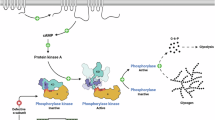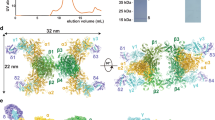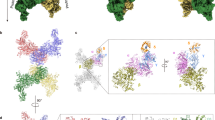Abstract
Muscle-specific deficiency of phosphorylase kinase (Phk) causes glycogen storage disease, clinically manifesting in exercise intolerance with early fatiguability, pain, cramps and occasionally myoglobinuria. In two patients and in a mouse mutant with muscle Phk deficiency, mutations were previously found in the muscle isoform of the Phk α subunit, encoded by the X-chromosomal PHKA1 gene (MIM # 311870). No mutations have been identified in the muscle isoform of the Phk γ subunit (PHKG1). In the present study, we determined Q1the structure of the PHKG1 gene and characterized its relationship to several pseudogenes. In six patients with adult- or juvenile-onset muscle glycogenosis and low Phk activity, we then searched for mutations in eight candidate genes. The coding sequences of all six genes that contribute to Phk in muscle were analysed: PHKA1, PHKB, PHKG1, CALM1, CALM2 and CALM3. We also analysed the genes of the muscle isoform of glycogen phosphorylase (PYGM), of a muscle-specific regulatory subunit of the AMP-dependent protein kinase (PRKAG3), and the promoter regions of PHKA1, PHKB and PHKG1. Only in one male patient did we find a PHKA1 missense mutation (D299V) that explains the enzyme deficiency. Two patients were heterozygous for single amino-acid replacements in PHKB that are of unclear significance (Q657K and Y770C). No sequence abnormalities were found in the other three patients. If these results can be generalized, only a fraction of cases with muscle glycogenosis and a biochemical diagnosis of low Phk activity are caused by coding, splice-site or promoter mutations in PHKA1, PHKG1 or other Phk subunit genes. Most patients with this diagnosis probably are affected either by elusive mutations of Phk subunit genes or by defects in other, unidentified genes.
Similar content being viewed by others
Log in or create a free account to read this content
Gain free access to this article, as well as selected content from this journal and more on nature.com
or
References
Chen YT : Glycogen storage diseases, in Scriver CR, Beaudet AL, Sly WS, Valle D (eds): The Metabolic and Molecular Bases of Inherited Disease, 8th edn. New York: McGraw-Hill, 2001, pp. 1521–1551.
Tsujino S, Nonaka I, DiMauro S : Glycogen storage myopathies. Neurol Clin 2000; 18: 125–150.
Kilimann MW : Glycogen storage disease due to phosphorylase kinase deficiency, in Swallow DM, Edwards YH (eds): Protein dysfunction in human genetic disease, Oxford: BIOS Scientific Publishers, 1997, pp 57–75.
Burwinkel B, Amat L, Gray RGF et al: Variability of biochemical and clinical phenotype in X-linked liver glycogenosis with mutations in the phosphorylase kinase PHKA2 gene. Hum Genet 1998; 102: 423–429.
Hendrickx J, Lee P, Keating JP et al: Complete genomic structure and mutational spectrum of PHKA2 in patients with X-linked liver glycogenosis type I and II. Am J Hum Genet 1999; 64: 1541–1549.
Maichele AJ, Burwinkel B, Maire I, Sövik O, Kilimann MW : Mutations in the testis/liver isoform of the phosphorylase kinase γ subunit (PHKG2) cause autosomal liver glycogenosis in the gsd rat and in humans. Nat Genet 1996; 14: 337–340.
Burwinkel B, Maichele AJ, Aagenaes Ö et al: Autosomal glycogenosis of liver and muscle due to phosphorylase kinase deficiency is caused by mutations in the phosphorylase kinase β subunit (PHKB). Hum Mol Genet 1997; 6: 1109–1115.
Van den Berg IET, van Beurden EACM, de Klerk JBC et al: Autosomal recessive phosphorylase kinase deficiency in liver, caused by mutations in the gene encoding the β subunit (PHKB). Am J Hum Genet 1997; 61: 539–546.
Burwinkel B, Shiomi S, Al Zaben A, Kilimann MW : Liver glycogenosis due to phosphorylase kinase deficiency: PHKG2 gene structure and mutations associated with cirrhosis. Hum Mol Genet 1998; 7: 149–154.
Burwinkel B, Tanner MS, Kilimann MW : Phosphorylase kinase deficient liver glycogenosis: progression to cirrhosis in infancy associated with PHKG2 mutations (H144Y and L225R). J Med Genet 2000; 37: 376–377.
Abarbanel JM, Bashan N, Potashnik R, Osimani A, Moses SW, Herishanu Y : Adult muscle phosphorylase b kinase deficiency. Neurology 1986; 36: 560–562.
Clemens PR, Yamamoto M, Engel AG : Adult phosphorylase b kinase deficiency. Ann Neurol 1990; 28: 529–538.
Carrier H, Maire I, Vial C, Rambaud G, Flocard F, Flechaire A : Myopathic evolution of an exertional muscle pain syndrome with phosphorylase b kinase deficiency. Acta Neuropathol 1990; 81: 84–88.
Wilkinson DA, Tonin P, Shanske S, Lombes A, Carlson GM, DiMauro S : Clinical and biochemical features of 10 adult patients with muscle phosphorylase kinase deficiency. Neurology 1994; 44: 461–466.
Laforet P, Eymard B, Lombes A et al: Exercise intolerance caused by muscular phosphorylase kinase deficiency. Contribution of in vivo metabolic studies. Rev Neurol (Paris) 1996; 152: 458–464.
Bak H, Cordato D, Carey WF, Milder D : Adult-onset exercise intolerance due to phosphorylase b kinase deficiency. J Clin Neurosci 2001; 8: 286–287.
Danon MJ, Carpenter S, Manaligod JR, Schliselfeld LH : Fatal infantile glycogen storage disease: deficiency of phosphofructokinase and phosphorylase b kinase. Neurology 1981; 31: 1303–1307.
Ohtani Y, Matsuda I, Iwamasa T, Tamari H, Origuchi Y, Miike T : Infantile glycogen storage myopathy in a girl with phosphorylase kinase deficiency. Neurology 1982; 32: 833–838.
Iwamasa T, Fukuda S, Tokumitsu S, Ninomiya N, Matsuda I, Osami M : Myopathy due to glycogen storage disease. Exp Mol Pathol 1983; 38: 405–420.
Shin YS, Plöchl E, Podskarbi T, Muss W, Pilz P, Puttinger R : Fatal arthrogryposis with respiratory insufficiency: a possible case of muscle phosphorylase b kinase deficiency. J Inher Metab Dis 1994; 17: 153–155.
Sahin G, Gungor T, Rettwitz-Volk W, Schlote W et al: Infantile muscle phosphorylase-b-kinase deficiency – a case report. Neuropediatrics 1998; 29: 48–50.
Bührer C, van Landeghem F, Brück W, Felderhoff-Müser U, Vorgerd M, Obladen M : Fetal-onset severe skeletal muscle glycogenosis associated with phosphorylase-b kinase deficiency. Neuropediatrics 2000; 31: 104–106.
Schneider A, Davidson JJ, Wüllrich A, Kilimann MW : Phosphorylase kinase deficiency in I-strain mice is associated with a frameshift mutation in the α subunit muscle isoform. Nat Genet 1993; 5: 381–385.
Wehner M, Clemens PR, Engel AG, Kilimann MW : Human muscle glycogenosis due to phosphorylase kinase deficiency associated with a nonsense mutation in the muscle isoform of the α subunit. Hum Mol Genet 1994; 3: 1983–1987.
Bruno C, Manfredi G, Andreu AL, Shanske S, Krishna S, Ilse WK, DiMauro S : A splice junction mutation in the αM gene of phosphorylase kinase in a patient with myopathy. Biochem Biophys Res Commun 1998; 249: 648–651.
Lederer B, van Hoof F, van den Berghe G, Hers HG : Glycogen phosphorylase and its converter enzymes in haemolysates of normal human subjects and of patients with type VI glycogen-storage disease. Biochem J 1975; 147: 23–35.
Shin YS : Diagnosis of glycogen storage disease. J Inher Metab Dis 1990; 13: 419–434.
Wehner M, Kilimann MW : Human cDNA encoding the muscle isoform of the phosphorylase kinase γ subunit (PHKG1). Hum Genet 1995; 96: 616–618.
Cawley KC, Akita CG, Angelos KL, Walsh DA : Characterization of the gene for rat phosphorylase kinase catalytic subunit. J Biol Chem 1993; 268: 1194–1200.
Maichele AJ, Farwell NJ, Chamberlain JS : A B2 repeat insertion generates alternate structures of the mouse muscle γ-phosphorylase kinase gene. Genomics 1993; 16: 139–149.
Wüllrich A, Hamacher C, Schneider A, Kilimann M : The multiphosphorylation domain of the phosphorylase kinase αM and αL domains is a hotspot of differential mRNA processing and of molecular evolution. J Biol Chem 1993; 268: 23208–23214.
Wüllrich-Schmoll A, Kilimann MW : Structure of the human gene encoding the phosphorylase kinase β subunit (PHKB). Eur J Biochem 1996; 238: 374–380.
Fischer R, Koller M, Flura M et al: Multiple divergent mRNAs code for a single human calmodulin. J Biol Chem 1988; 263: 17055–17062.
Kubisch C, Wicklein EM, Jentsch TJ : Molecular diagnosis of McArdle's disease: revised genomic structure of the myophosphorylase gene and identification of a novel mutation. Hum Mutat 1998; 12: 27–32.
Vorgerd M, Kubisch C, Burwinkel B et al: Mutation analysis in myophosphorylase deficiency (McArdle's disease). Ann Neurol 1998; 43: 326–331.
Burwinkel B, Shin YS, Bakker HD et al: Mutation hotspots in the PHKA2 gene in X-linked liver glycogenosis due to phosphorylase kinase deficiency with atypical activity in blood cells. Hum Mol Genet 1996; 5: 653–658.
Burwinkel B, Moses SW, Kilimann MW : Phosphorylase-kinase-deficient liver glycogenosis with an unusual biochemical phenotype in blood cells associated with a missense mutation in the β subunit gene (PHKB). Hum Genet 1997; 101: 170–174.
Bruno C, Servidei S, Shanske S et al: Glycogen branching enzyme deficiency in adult polyglucosan body disease. Ann Neurol 1993; 33: 88–93.
Shen J, Bao Y, Liu HM, Lee P, Leonard JV, Chen YT : Mutations in exon 3 of the glycogen debranching enzyme gene are associated with glycogen storage disease type III that is differentially expressed in liver and muscle. J Clin Invest 1996; 98: 352–357.
Ziemssen F, Sindern E, Schröder JM et al: Novel missense mutations in the glycogen-branching enzyme gene in adult polyglucosan body disease. Ann Neurol 2000; 47: 536–540.
Harmann B, Zander NF, Kilimann MW : Isoform diversity of phosphorylase kinase α and β subunits generated by alternative splicing. J Biol Chem 1991; 266: 15631–15637.
Ikeshima H, Yuasa S, Matsuo K, Kawamura K, Hata J, Takano T : Expression of three nonallelic genes coding calmodulin exhibits similar localization on the central nervous system of adult rats. J Neurosci Res 1993; 36: 111–119.
Bender PK, Dedman JR, Emerson CP : The abundance of calmodulin mRNAs is regulated in phosphorylase kinase-deficient skeletal muscle. J Biol Chem 1988; 263: 9733–9737.
Milan D, Jeon JT, Looft C et al: A mutation in PRKAG3 associated with excess glycogen content in pig skeletal muscle. Science 2000; 288: 1248–1251.
Jones TA, da Cruz e Silva EF, Spurr NK, Sheer D, Cohen PTW : Localisation of the gene encoding the catalytic γ subunit of phosphorylase kinase to human chromosome bands 7p12–q21. Biochim Biophys Acta 1990; 1048: 24–29.
Maichele AJ, Chamberlain JS : The γ phosphorylase kinase gene, Phkg, maps to mouse chromosome 5 near Gus. Mammalian Genome 1994; 5: 15–18.
Davidson JJ, Özcelik T, Hamacher C, Willems PJ, Francke U, Kilimann MW : cDNA cloning of a liver isoform of the phosphorylase kinase α subunit and mapping of the gene to Xp22.2–p22.1, the region of human X-linked liver glycogenosis. Proc Natl Acad Sci USA 1992; 89: 2096–2100.
Calalb MB, Fox DT, Hanks SK : Molecular cloning and enzymatic analysis of the rat homolog of “PhK-γT”, an isoform of phosphorylase kinase catalytic subunit. J Biol Chem 1992; 267: 1455–1463.
Westphal V, Kjaergaard S, Schollen E et al: A frequent mild mutation in ALG6 may exacerbate the clinical severity of patients with congenital disorder of glycosylation Ia (CGD-Ia) caused by phosphomannomutase deficiency. Hum Mol Genet 2002; 11: 599–604.
Burwinkel B, Sanjad SA, Al-Sabban E, Al-Abbad A, Kilimann MW : A mutation in GLUT2, not in phosphorylase kinase subunits, in hepato-renal glycogenosis with Fanconi syndrome and low phosphorylase kinase activity. Hum Genet 1999; 105: 240–243.
Halestrap AP, Price NT : The proton-linked monocarboxylate transporter (MTC) family: structure, function and regulation. Biochem J 1999; 343: 281–299.
Zorzano A, Fandos C, Palacin M : Role of plasma membrane transporters in muscle metabolism. Biochem J 2000; 349: 667–688.
Wang ND, Finegold MJ, Bradley A et al: Impaired energy homeostasis in C/EBP alpha knockout mice. Science 1995; 269: 1108–1112.
Croniger CM, Millward C, Yang J et al: Mice with a deletion in the gene for CCAAT/enhancer-binding protein beta have an attenuated response to cAMP and impaired carbohydrate metabolism. J Biol Chem 2001; 276: 629–638.
Lerin C, Montell E, Berman HK, Newgard CB, Gomez-Foix AM : Overexpression of protein targeting to glycogen in cultured human muscle cells stimulates glycogen synthesis independent of glycogen and glucose 6-phosphate levels. J Biol Chem 2000; 275: 39991–39995.
Cawley KC, Akita CG, Wineinger MA, Carlsen RC, Gorin FA, Walsh DA : Coordinated expression of phosphorylase kinase subunits in regenerating skeletal muscle. J Biol Chem 1992; 267: 17287–17295.
Ng DC, Carlsen RC, Walsh DA : Neural regulation of the formation of skeletal muscle phosphorylase kinase holoenzyme in adult and developing rat muscle. Biochem J 1997; 325: 793–800.
Acknowledgements
We thank the patients, their primary care physicians (Drs Vincensini, Kerschbaumer, Ormanns), and Professor Andrew G Engel (Mayo Clinic, Rochester, MN) and Professor Henri Carrier (Lyon) for their support, and Dr Irene Maire (Centre Hospitalier Universitaire, Lyon) for critical reading of the manuscript and valuable suggestions. This work was supported by the Deutsche Forschungsgemeinschaft (Ki 324/11), the University of Bochum Medical School intramural research funding program (FoRUM), and the Fonds der Chemischen Industrie.
Author information
Authors and Affiliations
Corresponding author
Rights and permissions
About this article
Cite this article
Burwinkel, B., Hu, B., Schroers, A. et al. Muscle glycogenosis with low phosphorylase kinase activity: mutations in PHKA1, PHKG1 or six other candidate genes explain only a minority of cases. Eur J Hum Genet 11, 516–526 (2003). https://doi.org/10.1038/sj.ejhg.5200996
Received:
Revised:
Accepted:
Published:
Issue date:
DOI: https://doi.org/10.1038/sj.ejhg.5200996
Keywords
This article is cited by
-
Novel mutations in the PHKB gene in an iranian girl with severe liver involvement and glycogen storage disease type IX: a case report and review of literature
BMC Pediatrics (2021)
-
Myopathies Related to Glycogen Metabolism Disorders
Neurotherapeutics (2018)
-
PHKA2 mutation spectrum in Korean patients with glycogen storage disease type IX: prevalence of deletion mutations
BMC Medical Genetics (2016)
-
Rhabdomyolysis: a genetic perspective
Orphanet Journal of Rare Diseases (2015)
-
Neuromuscular Disorders of Glycogen Metabolism
Current Neurology and Neuroscience Reports (2013)



